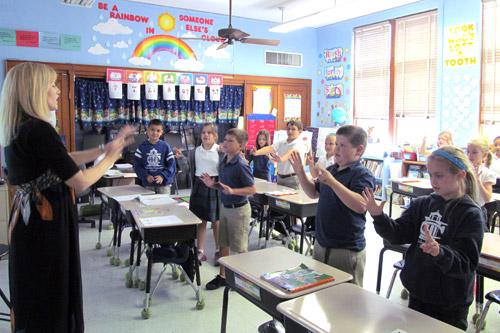
FORT SMITH — At Immaculate Conception School, every child, no matter how small, has learned to “make his own weather.”
Having a sunny attitude on cloudy, rainy days may not cause meteorological changes, but it has created a very positive climate for faculty, students and parents there.
“Last year one of my school parents visited Beard Elementary School (Fort Smith) through the local Chamber of Commerce and saw a program, ‘The Leader in Me,’ in action there,” principal Sharon Blentlinger said. “She was so impressed by the students and their demeanor that I decided to attend a forum in Tulsa to learn more about the program.”
She learned that the program was based on Sean Covey’s “Seven Habits for Happy Kids.” Covey, son of Stephen Covey, author of “The Seven Habits of Highly Effective People,” envisioned schools filled with responsible, creative students who knew how to set and attain goals, get along with people from different backgrounds and solve problems positively.
Every child has unique gifts, but all have the capacity to be leaders who are able to “do the right thing even when no one is watching,” Covey teaches.
Immaculate Conception School just completed its first year of a three-year plan. The school hired a consultant for professional development to work with staff for five days last summer to help them implement the seven habits in their own lives. A seven-person “lighthouse” team comprised of six faculty members and one parent volunteer met monthly to prepare for the program’s implementation day — Martin Luther King Day Jan. 21.
“This isn’t a packaged program,” Blentlinger said. “Each school customizes its own program; it’s very important to fit each unit to the school culture. When we have Bible study at morning assemblies we may ask questions like, ‘How did Jesus replenish in this Bible story?’ Each teacher customizes the program to the ability and maturity level of her class, but we all try to connect our Christian Catholic culture to the habits.”
The habits are:
1. Be proactive
2. Begin with the end in mind
3. Put first things first
4. Think win-win
5. Seek first to understand, then to be understood
6. Synergize
7. Sharpen the saw
Everyone in the school — from teachers to cafeteria workers to students — have learned to speak the language of the seven habits. At meetings and through weekly handouts, parents are educated in the language of the seven habits and given helpful tips and activities for following up at home.
“A first-grader came up to me recently and said, ‘We synergized to make this hat,’” Blentlinger said.
At the introduction of the program each class, from preschool through sixth grade, composed a class mission statement and selected three or four leadership quotes to guide their class. The school focused on helping students acquire one habit a week and reinforcing all the habits that had previously been acquired.
Kathy Weidman’s second-graders proudly displayed a class mission statement on their classroom door and recited their seven habits complete with hand motions.
“This week each class is working on the leadership skills of greeting people appropriately and making requests respectfully,” Blentlinger said.
In the second year of implementation, Immaculate Conception will help students create data notebooks in which they can set academic and personal goals.
“If students own their goals, they take greater pride in ownership,” Blentlinger said.
When the program is fully implemented in 2015, Immaculate Conception School hopes to achieve “lighthouse status,” a position only 5 percent of the 1,200 participant schools have achieved.
“Something powerful happens when everyone in the school ‘speaks the same language,’” Blentlinger said.
Please read our Comments Policy before posting.
Article comments powered by Disqus 'Cabrini' film tells story of saint with great faith
'Cabrini' film tells story of saint with great faith
 Bishop Taylor announces more pastoral appointments
Bishop Taylor announces more pastoral appointments
 Most U.S. Catholics approve of Pope Francis, Pew says
Most U.S. Catholics approve of Pope Francis, Pew says
 Winning directory photo honors Our Lady of Guadalupe
Winning directory photo honors Our Lady of Guadalupe
 St. Joseph a model of solidarity with immigrants
St. Joseph a model of solidarity with immigrants
 Two gifts after Jesus’ death: Virgin Mary and Eucharist
Two gifts after Jesus’ death: Virgin Mary and Eucharist
 Why we have an altar, and not just a communion table
Why we have an altar, and not just a communion table
 Pope: Wars should be resolved through nonviolence
Pope: Wars should be resolved through nonviolence
 Living relationship with Jesus Christ in the Eucharist
Living relationship with Jesus Christ in the Eucharist